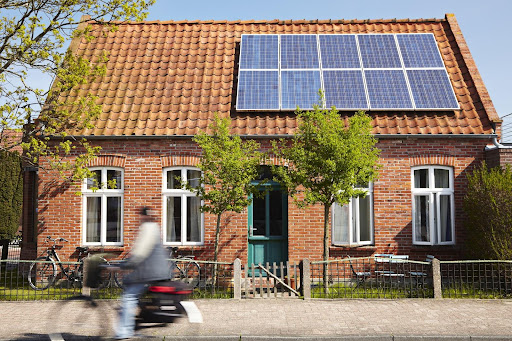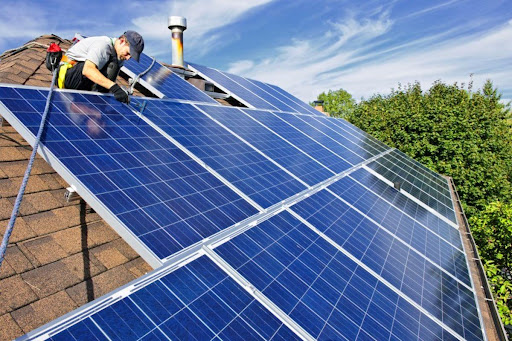
The efficiency of solar panels has come a long way in the past few years.
This renewable energy system has grown in popularity in the United Kingdom, especially with those looking to save on their energy bills.
Let's look at the different types of solar panels, their efficiency, and how to utilise them best to guarantee the highest possible solar panel efficiency.
According to the US National Renewable Energy Laboratory, solar panel efficiency can be defined as the rate at which solar panels can absorb sunlight and use it to generate electricity.
The use of this photovoltaic technology has skyrocketed in recent years as the technology becomes more reliable, with an efficient panel harnessing about 20% or more of the sunlight that hits its surface.
Solar panel efficiency is divided into two main considerations:
Solar cell efficiency is the percentage of sunlight that shines on each cell that can be converted to electricity.
The solar cell type will greatly affect the panel's efficiency, as the structure and type of cell used greatly affects how well or poorly it can absorb and convert sunlight.
Cells made of silicon are either P-type or N-type, with the N-type having higher efficiency levels.
There are several types of solar panels, from monocrystalline panels, which are the most efficient, to polycrystalline panels, which utilise multiple silicon crystals to absorb light.
There are also thin-film solar panels, which utilise a thin film of photovoltaic material to absorb light, allowing them to remain lightweight. However, they degrade faster than the previous options.
Plenty of factors, such as the type of solar cells, amount of sunlight, temperature, and back sheet colour, all play a part in solar panel efficiency, so you will need to choose wisely to get the highest efficiency.
When choosing between these photovoltaic panels, you will need to look at how effectively their cells absorb light and convert it to electricity.
Most solar panels don't convert that much sunlight, with the maximum efficiency of solar panels being about 23% and the panels with lower efficiency hovering at 15%.
Choosing higher efficiency is important because it allows you to gain the same electricity as you would with more but lower-efficiency solar panels.
Different types of solar panels yield different real-world efficiency levels, so you must choose the right cell type for the highest possible efficiency.
Normal polycrystalline silicon will yield only 15 to 18%, while monocrystalline yields 16.5 to 19%.
Using PERC (Passivated Emitter Rear Cell) versions of these materials raises the results slightly to 19.5% and 20%, respectively.
N-type Monocrystalline HJT (Heterojunction Technology) and IBC (Interdigitated Back Contact) outclasses these previous options by almost 22.8%, the highest panel efficiency currently available.
The highest-efficiency solar panel type is N-type IBC monocrystalline solar panels. To find out why we'll need to look at how solar cells are made and how they cause panels to function:
N-type Interdigitated Back Contact monocrystalline cells are made of the purest silicon, which is turned into a single rod and then processed into wafers.
This pure form allows the panel to achieve anywhere between 22 and 27% efficiency, which is higher than both polycrystalline and thin-film cells. Its purity is what allows it to absorb and process more sunlight.
Monocrystalline panels are recognisable by their rounded edge and darker colour.
Polycrystalline solar panels are made of multiple crystals, making them less effective at 15–22% efficiency. These panels can be identified by their square cut and blue-speckled colour.
Thin-film solar cells contain only a tiny sliver of photovoltaic material, making them far easier and cheaper to produce but much less powerful.
Thin-film cells are growing in efficiency and may soon match their silicon counterparts.
When looking at the amount of electricity that makes it to the solar modules, we also have to look at solar panel manufacturers to see who produces the best solar panels and what efficiencies they offer.
Fortunately, the top brands among UK solar suppliers now offer product ranges above 22% efficiency:
You can't go wrong by choosing solar panels from these UK solar providers. These companies are also hands-on when it comes to solar panel installation.
When in doubt, it is best to contact these companies directly for solar quotes to see the cost of their solar panels per square metre to make the most out of your investment.
Even though solar panel manufacturers strive to make solar panels as efficient as possible, total conversion efficiency remains limited.
However, power generation can be bolstered. Here are the factors to consider if you want to increase your maximum power output and solar panel efficiency:
Solar panel components help determine how much electricity your panels can absorb, almost as much as the amount of sunlight on the surface of your panel.
While the vast majority of solar panels will contain silicon, the choice of monocrystalline, polycrystalline solar panels, and thin-film solar panels, will determine how much electricity you can gather.
It surprises people that even the colour of the protective back sheets of their solar system can affect how much light it absorbs and how much turns into heat.
In this case, it is best to avoid the black and dark back sheets as they can absorb more heat, which means less light absorbed and less energy efficiency.
Too much shade and cloudy or rainy weather negatively affect how much sunlight your panels can absorb and, thus, their power output.
Suppose you're in a gloomy and constantly-cloudy region of the UK. In that case, it may be worth investing in a panel that automatically follows the sun as it travels for maximum absorption.
It is recommended that UK solar users install their panels on south-facing roofs for higher output and efficiency.
The larger your panel, the more cells it contains. This ensures higher efficiency rates because it has more cells to absorb light. Rather than buy more panels, you can buy a larger one.
To prove that statement, here is the number of cells found in a panel of a given size:
That said, you will need to look at how effective a given panel's cells are and not just the size of the panel. If you live in a smaller building, you may get by using smaller panels.
Higher-temperature solar panels will not be able to absorb light as effectively as they will be too busy trapping heat. You are then left with a less efficient panel and a lower power rating.
It is thus important to find the right cell temperature. It can't get too hot if you want to be able to harness sunlight efficiently.
Before you install solar panels to power your home, it's important to consider how much electricity you and your family use.
The less you use, the less "worth it" solar energy becomes.
As previously stated, total panel efficiency ratings measure how much energy from the sun your solar cell can absorb and convert into electricity.
You can calculate this efficiency percentage by dividing your maximum power rating under standard test conditions (cell temperature of 25°C, solar irradiance of 1000W/m2, and air mass of 1.5) by the total panel area in square metres.
This is represented in formula form:
Efficiency (%) = PMax/ (Panel Area x 1000 W/m^2) x 100
PMax being your max panel power in watts (W).
The benefits of solar power, especially in residential installations, cannot be understated.
Here are some of the best reasons to invest, not just in a solar panel, but a complete solar system for your home:
The most efficient solar panels with peak cell efficiency will generate enough electricity to meet most of your electric household needs, making you less dependent on the electric grid.
This is a great way to save money in the long run, as you will not need to replace your solar panels for decades to come and will rely less and less on the grid for your electricity.
Most debris and particles that can potentially block the surface of your solar panels can be washed away with some rain.
These panels are fairly resilient, and you can get by with minimal inspection and maintenance.
The sun is a great energy source because it will be around for billions of years and won't run out anytime soon. You can expect a consistent supply of solar radiation for as long as your panels last.
While solar power isn't the mainstream source of electricity just yet, manufacturers are constantly innovating and looking for new ways to increase overall efficiency, which will yield greater results.
Not all solar panels are created equal.
Before parting with your hard-earned money by investing in solar panels, you must consider the following factors when choosing which model and brand to buy:
As with anything else in life, solar panels cost money. While polycrystalline solar panels may be the cheapest options, they are underpowered, and cell efficiency suffers.
Thus, it is a matter of balancing your budget with how much electricity you need.
After all, you get what you pay for, and the higher the solar panel efficiency, the higher the price.
You must choose the highest power output given your price range. You can canvas across different manufacturers to see if they have deals.
Seeing as your solar panels will be located outdoors and constantly exposed to the elements, you will need to acquire panels that have been tested under harsh conditions.
These include snow testing, hail, wind, chemical residue, heat/humidity, and other factors that will bear down on them daily. Your panels should be able to survive them all!
You must look for panels that are up to standard from manufacturers that guarantee their long-term and durable performance. They should be able to withstand decades worth of hardship.
How the panels were manufactured also plays a big role in how long they last before the amount of power they can generate is no longer ideal.
They should last for at least 25 years.
Solar panels are long-term investments and should last for as long as possible. That said, you should see a return on investment within two years of use.
Every year after that translates into savings and increased energy independence.
Aside from looking at how easy or hard the solar panel installation process will be with a certain brand or silicon cell type, you should also consider aesthetics or how they'll look splayed out on your roof.
Solar cells have different shapes and colours, so you must consider their appearance and not just solar cell efficiency.

While the most efficient solar panels currently available only have an efficiency of 23% at most, solar panel efficiency will continue to improve in the coming years as the technology becomes more prevalent.
Suppose you're looking for a high-efficiency panel for your home. In that case, it's best to run through the above recommendations and enquire with these companies to see if they offer cheaper solar quotes.
It's important to note that while efficiency is a vital factor to consider when choosing to use solar power, it's equally important to choose solar panels based on durability, lifespan, and daily use.
Did you know that Solar Panel Installation can match you with 3 local installers who will provide you with a free quote? Fill out our form today to get in touch with installers.